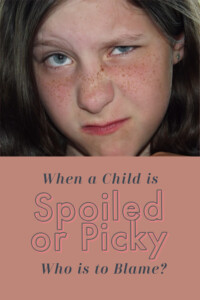When a Child is Spoiled or Picky, Who is to Blame?
 Scenarios of spoiled or picky.
Scenarios of spoiled or picky.
The husband looked at his wife as she tried to cajole their little one.
“You’re spoiling her,” he told her, quietly, but firmly.
Instantly, the mom had a reason for what she was doing: “The child was sick, after all, and she needed to take care of her child”!
Her husband (and father of the same child) didn’t say any more, but the look on his face told me what he thought – that she was spoiling their child. I watched the subtle drama unfold, and I had to admit he was right.
We watched a woman who was raising her niece threaten a “whooping” to the child if she did this “one more time.” The spouse commented to those of us within earshot, “If this child ever gets a whooping, it’s going to be a good one, because she’s been “fixin’ to” give her one for a long, long time.” It was funny, but it wasn’t – because it was true.
That’s how a child becomes spoiled or picky – because the adults in his life cave to his whims.
Defining spoiled or picky
One thing I know is true: when a child is spoiled or picky, he did not become that way by himself. He had help from someone – or more than one person. A child is not able to spoil himself, but he is certainly capable of demanding his wants.
A picky child is one who is “extremely fussy or finicky, usually over trifles.” When we allow a child to be fussy or picky, when we cater to how a child wants a food fixed or only serve what he wants to eat, we create a picky child. A picky child cannot become picky by himself. He has the help of adults to get there.
I overheard a mom tell a friend one day, “I just can’t get him to eat anything except chicken nuggets, French fries, and pizza.” I wonder how many times those choices were not on the table? I wanted to suggest to her (but didn’t because I was merely eavesdropping) that this was her fault, and not the child’s.
The definition of “spoil” is: “to harm the character of (someone, especially a child) by being too lenient or indulgent.”
When we are too lenient or too indulgent, the child becomes spoiled. The child does not do the spoiling – it’s the adults (or sometimes older, minor children) who get that credit. When we give in to the way a child wants things to be done, we create a picky child. It’s as simple as that.
Dissecting pickiness and spoiled-ness
I share these tips, not because we did it right, but because it’s easier to see how we should have parented once we are on the other side. There were times I deliberately fixed foods my kids did not like because I was tired of the complaints at the supper table. I told my kids, “I’m a mother, not an octopus. I cannot fix food six different ways at each meal.” You can bet your bottom dollar that on his birthday, the child got to choose the menu fixed the way he liked it. The other 364 days of the year? Never happen!
Tips on spoiled and picky kids
Here are some ideas for your consideration to encourage you to avoid parenting that produces spoiled or picky kids.
- Is it good character development to allow your child to have things always done only his way? When a child is insistent on having something done a certain way, decide whether his way is the only way and if it really is necessary to accommodate this “need” – or if doing so will make this child continue to be picky.
- Is it good character development to cater to a child’s pickiness and whims? When a child is particular about foods – whether it’s the taste or how they are fixed, decide whether the way she wants it is a deal breaker. Decide if perhaps she needs to learn that there are other possible ways to eat certain foods or if she is capable of learning to eat a previously unknown food item. Be the parent, not a sibling or friend.
- Is it good character development to allow a child to cajole us to give in because she pouts or pitches a fit? When a child pitches a fit or cries pitifully when she does not get her way, decide if her reason for wanting her way is reasonable or if her pouting is evidence of mere selfishness. She needs to learn that things in her life will not always go her way. You need to decide who is really in charge around here.
- Is it good character development to let your child get away with “making you pay”, when he doesn’t get his way? When a child “makes you pay” for not giving in to to his whims, recognize that he has now become the “adult” and thus made you the “non-adult.” Is this what you want to be? Are you trying to be your child’s best friend instead of his parent?
When a child should be allowed to have things catered to his needs
Some children have allergies or irritations that they can’t explain. Forcing a child to do something that causes discomfort will not help you connect with him. If he is, however, being spunky and stubborn, then consider the “why” behind what he is demanding.
Pay attention to the places, things, and events that cause your child discomfort or turmoil. Is he always nauseous after eating a particular food? Does he get a headache after he’s been to certain places? Is she more emotional after being around certain people? Is he more irritable in certain settings? All of these can be indicators of allergies to foods, pollens, perfumes, mold, or fabric. Sometimes certain people have threatened or harmed our kids. Pay attention to their complaints and keep track of events, times, places, and substances that could give clues to physical or emotional problems with your child.
Be the parent. Let your child be the child.
You can figure it out if you really want to do what is best for your child. Take the time to decode the stubbornness, pickiness, and spoiled-ness. Figure out the root problem. Figure out the cause. Ask God for wisdom. Develop a plan, and then map a way out of the jungle. That’s what good parenting does.

Photo credit: LiveLaughLove/Pixabay.com







